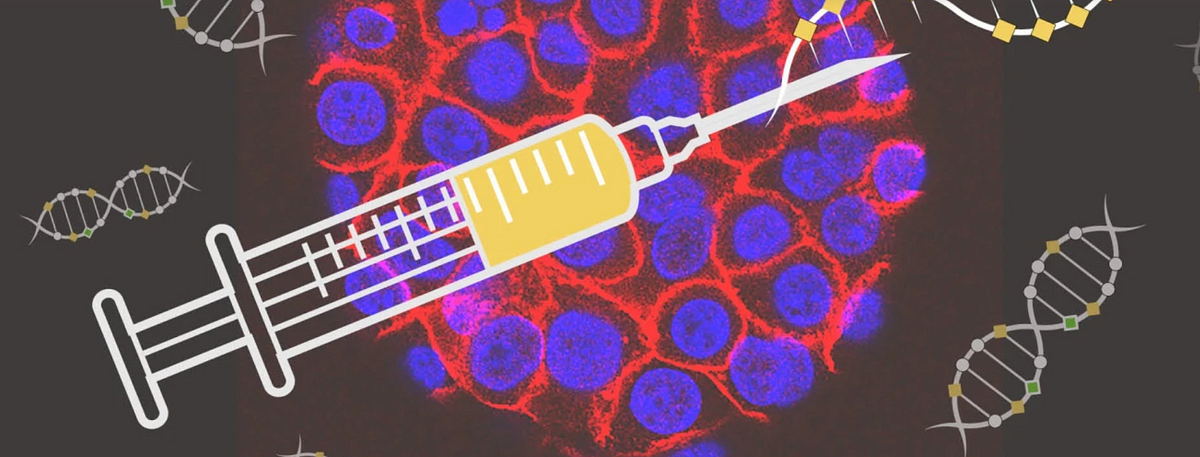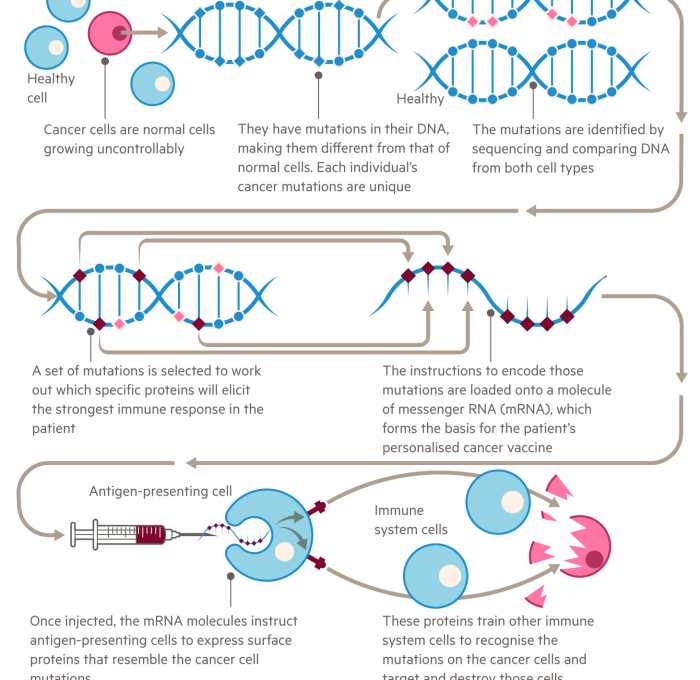Personalised cancer treatments are among those being developed using a technology once distrusted by big pharma
Financial Times (FT)
Nikou Asgari
October 12th, 2021
© FT montage; Min Yu (Eli and Edythe Broad Center for Regenerative Medicine and Stem Cell Research at USC),USC Norris Comprehensive Cancer Center, Pancreatic Desmoplasia | Pancreatic cancer cells
In 2017, Vinod Balachandran published a paper in the science journal Nature explaining an interesting phenomenon that he had discovered in a tiny number of pancreatic cancer survivors.
T-cells circulating in their blood had developed the ability to identify, remember and fight back against proteins in the deadly tumours.
The surgeon, from New York’s Memorial Sloan Kettering Cancer Center, likened it to “auto-vaccination”.
Balachandran described how actual vaccines using messenger RNA molecules could be used to replicate the response and give more patients the ability to defend themselves against the often fatal tumours.
His research caught the eye of a then little-known scientist, Ugur Sahin, chief executive of German biotechnology company BioNTech, who was so intrigued by the findings that he invited Balachandran’s team to Mainz.
Over dinner at Heiliggeist, a nearly 800-year-old church-turned-restaurant on the banks of the river Rhine, and joined by scientists from Swiss pharmaceutical company Genentech, the group discussed the potential of mRNA vaccines to treat pancreatic cancer.
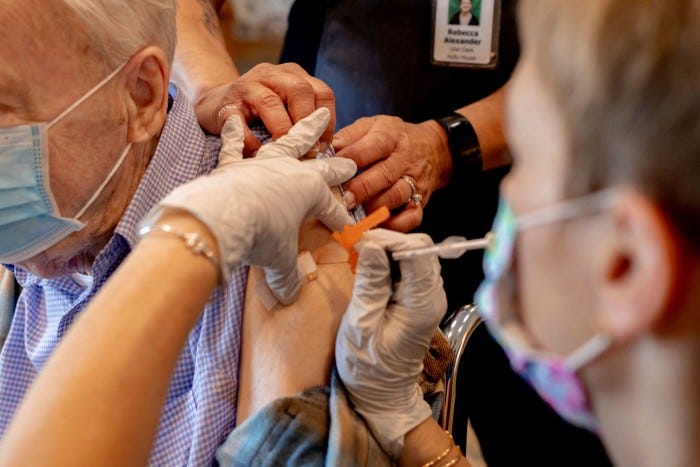
“It was beautiful,” says Balachandran about the restaurant that once served as a hospital, and the conversation: “The purpose and the mission was common between us.”
Survival rates among pancreatic cancer patients are low.
- Only 10 per cent survive longer than five years, according to the American Cancer Society, making it one of the deadliest forms of the disease.
- By comparison, 90 per cent of breast cancer patients survive over the same period of time.
Survival rates among pancreatic cancer patients are low. Only 10 per cent survive longer than five years ..
Two years of research followed the dinner and in December 2019, 20 patients were enrolled in the first clinical trial assessing mRNA vaccines in pancreatic cancer sufferers.
With the world about to learn of a novel coronavirus, BioNTech and others would soon pivot their mRNA work to create a vaccine against Covid-19.
While the mRNA vaccines made by BioNTech/Pfizer and Moderna have become synonymous with helping to dramatically reduce deaths from Covid-19, Balachandran is among a growing group of scientists using the medical technology to investigate treatments for other illnesses.
… Balachandran is among a growing group of scientists using the medical technology to investigate treatments for other illnesses.
Proponents of mRNA argue that combating Covid-19 is just the start and that its wider adoption heralds a revolution in modern medicine.
Cures for some forms of cancer are among several areas being explored. Pharmaceutical companies are now turning their attention to the power of mRNA to tackle a range of illnesses
- from flu
- to heart disease
- and HIV.
Very early vaccine trials are also under way for
- the Zika virus,
- yellow fever and
- rare diseases such as methylmalonic acidemia, where the body is unable to break down proteins.
“Five years ago there was hesitation from the larger companies about investing in this space,” says Michael Choy, head of life sciences at Boston Consulting Group. “Having so many people receive the mRNA product [for Covid] has made a big difference.”
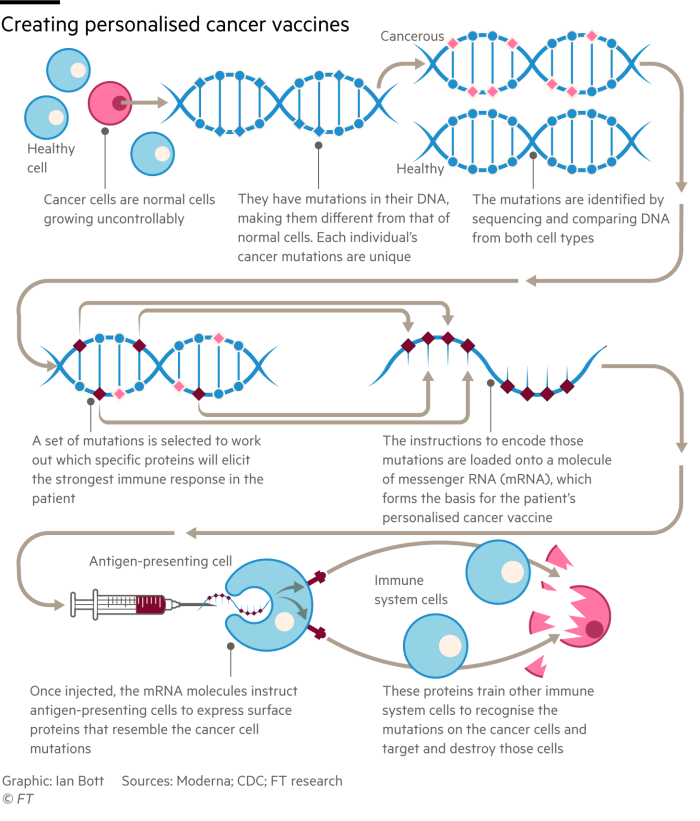
Covid changes everything
The success of the Covid-19 vaccines has transformed the scientific and commercial view of the technology.
No mRNA-based product had ever been approved by regulators until the crisis, and despite years of research the technology was regarded by some in the industry as difficult to commercialise.
“It is often a combination between medical need and feasibility,” says Sahin, about how the company has chosen the illnesses to target.
- BioNTech’s focus has always been on creating individualised vaccines tailored to attack specific cancers, an approach that Sahin, an oncologist, believes will revolutionise the treatment of the disease.
The company has begun drug trials to treat colorectal, breast, skin and other cancers.
- Other drugmakers including Moderna are also studying personalised cancer vaccines using mRNA.
They hope to treat diseases that are among the leading causes of death worldwide while also tapping into the multibillion-dollar oncology market.
Sales of cancer therapeutics are forecast to hit $250bn by 2024, up from $143bn in 2019, according to McKinsey.
“The motivation for this individualised cancer vaccine is that every tumour is different,” Sahin says, adding that even patients with the same cancer type do not have identical tumours, meaning a personalised treatment is likely to be more effective than a one-size-fits-all approach.
Therapeutic cancer vaccines aim to stimulate an immune response against existing tumours, rather than preventing disease like a flu shot.
They are tailored to the specific mutations in a patient’s tumour.
Scientists remove tissue from the tumour through a biopsy and then sequence the mutations found in the cancer cells.
The findings are compared to the DNA in a patient’s blood and algorithms are used to predict which specific proteins will elicit the strongest immune response.
These proteins are then encoded — 20 of them, by both BioNTech and Moderna — into an mRNA molecule that forms the essence of the cancer vaccine.
Once injected, the instructions carried on the mRNA vaccine tell the body’s cells to express certain proteins which train the immune system to recognise the mutations on the cancer cells as foreign agents, and then attack and destroy those cells.
“We started in 2014 and the time from tumour sample to vaccine was about three months but now with automation . . . it takes less than six weeks,” Sahin says.
Existing cancer vaccines primarily target the virus causing the cancer, rather than the tumour itself.
In the US, the non-mRNA HPV vaccine is given to children as young as nine in order to protect against cervical cancer, which can be caused by the human papillomavirus.

No more ‘dabbling’
Beyond cancer, mRNA trials are under way for various infectious diseases.
Influenza vaccine studies are expected to produce results most quickly. An infectious disease such as Covid or flu mutates over time and so vaccines must be updated annually for new strains.
Existing flu vaccinations use inactivated versions of the virus and provide between 40 per cent and 60 per cent protection because from the time the vaccine is made to when it is administered, the virus has often already mutated.
It is hoped that mRNA, which can be adapted more quickly, will dramatically increase the efficacy of seasonal flu jabs.
Continuing its partnership with BioNTech, Pfizer in September started trials of an mRNA flu vaccine for adults aged between 65 and 85, one of the groups most vulnerable to the illness.
“The lowest hanging fruit is in viral vaccines because we have this clear proof of concept,” says Philip Dormitzer, chief scientific officer of Pfizer. “But we don’t think that’s the endpoint.”
He adds that the company was already working with BioNTech on developing a flu shot when Covid hit “so we obviously switched to work on a Covid-19 vaccine using very much the technology that we were preparing for the flu vaccine. As bandwidth opens up, we are now going back to working on the flu vaccine.”
- Pfizer’s flu jab is its only other mRNA collaboration with BioNTech so far.
“I think we are capable of going alone for everything but that doesn’t necessarily mean that’s what we’ll choose to do,” says Dormitzer.
The company has yet to reveal which other areas it plans to target with mRNA but Dormitzer says rare diseases, protein replacement and gene editing “are all of interest”.
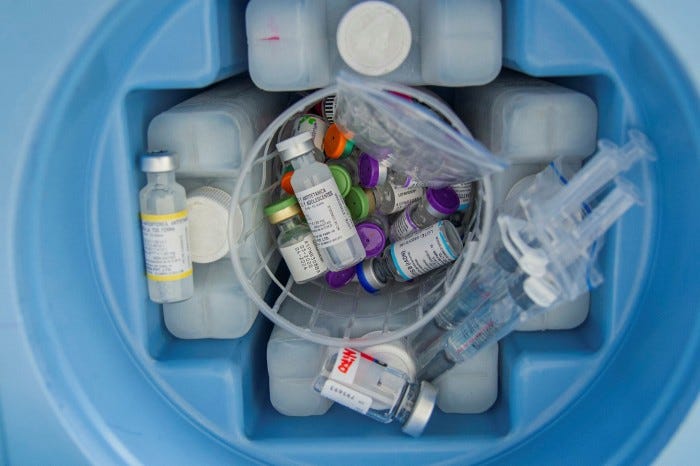
“There may be companies who say ‘we have 20 vaccines in our pipeline. You’re not going to see that approach coming from Pfizer,” he adds.
- By contrast, at Moderna’s annual research and development day in September, the company laid out its mRNA plans — all 34 of them, in six different areas of medicine.
The 11-year-old biotech group, whose stock market ticker is MRNA, is spending about half of its energy on tackling respiratory viruses and other infectious diseases, according to Stephen Hoge, its president, and the other half on cancer vaccines, rare diseases and gene therapy.
“It’s tragic that we’re going to have about 4m Covid deaths this year,” says Hoge, “but every year, there are about 4m deaths from respiratory viruses.
The difference is that it is just in smaller buckets . . . half a million here, 100,000 there, and it totals up to a terrifying number every year.”
“It’s tragic that we’re going to have about 4m Covid deaths this year,” says Hoge, “but every year, there are about 4m deaths from respiratory viruses.
The Massachusetts-based company aims to create a pan-respiratory vaccine that would provide combined immunity from Covid-19, flu and other infections such as respiratory syncytial virus — a common disease that can cause lung infections — in one jab.
“Nobody wants to be a pin cushion,” adds Hoge.
“We can actually get this into one needle.”
Each of Moderna’s respiratory vaccines must be individually assessed before a combination is made.
The company started trials of its flu shot in July while its vaccine for cytomegalovirus, a disease that has no vaccine and can cause birth defects in babies, is in phase 2 trials and still some way from regulatory approval.
Responding to criticism that Moderna — whose Covid vaccine is its only approved drug to date — is aiming too high with 34 programmes, Hoge argues that although some pharmaceutical companies are “dabbling” in mRNA now that its effectiveness has been proven by the Covid vaccines, Moderna is all in.
Success is not guaranteed
The scientific and commercial success of the two mRNA Covid-19 vaccines has spurred a rush of investment into the sector.
New mRNA treatments are expected to begin entering the market from 2025, according to research by Boston Consulting Group.
Revenues are expected to peak at $23bn in 2035, with prophylactic and therapeutic cancer vaccines comprising 50 and 30 per cent of sales respectively.

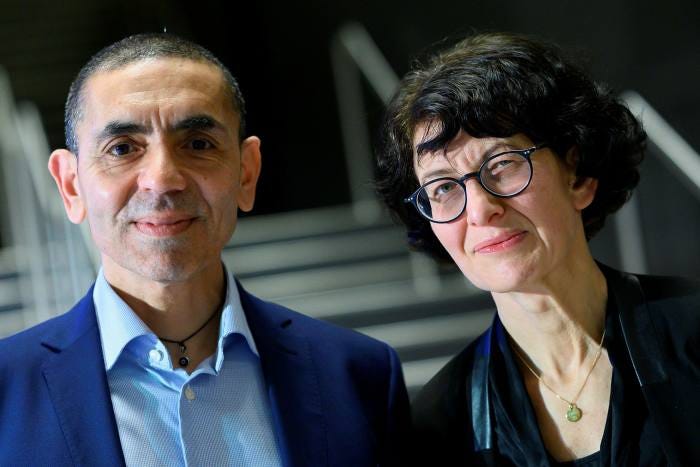
Julia Angeles, investment manager at Baillie Gifford, an early investor in Moderna, believes that mRNA is set to revolutionise many aspects of medicine.
Baillie Gifford is the biggest single investor in Moderna with a 11.4 per cent stake and is the fourth largest shareholder of German mRNA-focused company CureVac, underscoring the group’s faith in the future of the method.
“I genuinely think that Moderna is going to be the first biotech company to reach a $1tn valuation,” says Angeles, of a company currently valued at $124bn. “In five years it is likely . . . because no one has the breadth and depth of technology that Moderna has.”
Some might dismiss that as investor hype, but other companies are priming to compete.
- French pharmaceutical group Sanofi stopped trials of its own mRNA Covid jab in October, saying that it was too late to enter a market dominated by BioNTech/Pfizer and Moderna.
However, the company has committed to the potential of the technology by setting up an mRNA centre to develop vaccines into which it will invest €400m a year.
Sanofi also bought its partner Translate Bio for $3.2bn in August, hoping to capitalise on its mRNA therapeutics in areas including cystic fibrosis and lung disease.
- US drugmaker Merck is also on the prowl for acquisitions, eyeing up several mRNA therapeutics companies;
- while in the UK, AstraZeneca struck its first RNA deal in September, partnering with VaxEquity to develop up to 26 drugs.
Yet, despite the optimism and Covid-era breakthroughs, it will take years before trials in some areas start producing results and for drugs to be approved.
Regulators around the world accelerated their approval processes during the pandemic because of the urgent need for a vaccine, a speed that is unlikely to be replicated for other medicines.
Hoge says Moderna’s respiratory syncytial virus vaccine, which is set to move to phase 2 trials, could be ready in three years, if the data is successful. But he acknowledges that “the Covid pandemic was a unique circumstance”.
“If people want to be . . . a little more conservative, or see a little more data before they make a decision, it could take a few years. But I hope faster than that,” he adds.
The likelihood of failure is incredibly high. Less than 10 per cent of drugs that enter phase 1 trials ever reach the market, according to research by the Washington-based Biotechnology Innovation Organization. Nearly 60 per cent of drugs which make it to phase 3 trials still fail.
David Braun, an oncologist focusing on kidney cancer at the Dana-Farber Cancer Institute in Boston, says it is a long road from Covid vaccine to personalised cancer jab.
“Medicine has made this mistake many times in the past, going from enthusiasm and great ideas to overpromising,” he says. “There’s a lot of promise for mRNA to be used beyond infectious disease but it’s a big leap.”
And mRNA vaccines do not always provide blockbuster results.
German biotech CureVac abandoned its mRNA Covid vaccine on Tuesday after disappointing trial results showed only 48 per cent efficacy.
The company has decided to focus on its mRNA Covid jab with GlaxoSmithKline instead. “It is an example that we don’t know everything we need to know yet about what makes these therapies work,” says BCG’s Choy.
Selecting the illnesses to target will be a crucial decision for new entrants to the mRNA market.

“It does not make sense to replace, for example, a protein-based vaccine which is highly effective, has 95 per cent effectiveness, and try to make an mRNA,” says BioNTech’s Sahin.
“The question here is what is going to be improved?”
Vaccines for chickenpox, shingles and MMR are unlikely to be replaced by mRNA-based treatments as they are effective and researchers are focusing on illnesses where patients’ outcomes can be improved.
But armed with the success of the Covid vaccines the industry’s top scientists are not short on big and bold ambitions.
Sahin points to the prospect of gene therapy to help repair damaged tissues and organs as a possible frontier that mRNA can help cross in the decades to come, potentially opening the way to delivering new gene therapies such as Crispr.
“Organ repair will be an important topic for the future,” he says, “this is exciting.”
Originally published at https://www.ft.com on October 13, 2021.
TAGS: Vaccines Platform; mRNA, Personalized Medicine; Cancer;
Names cited:
- Vinod Balachandran, surgeon, from New York’s Memorial Sloan Kettering Cancer Center;
- Ugur Sahin, chief executive of German biotechnology company BioNTech;
- Michael Choy, head of life sciences at Boston Consulting Group;
- Julia Angeles, investment manager at Baillie Gifford, an early investor in Moderna,
- David Braun, an oncologist focusing on kidney cancer at the Dana-Farber Cancer Institute in Boston;
- Philip Dormitzer, chief scientific officer of Pfizer;
- Stephen Hoge, president of Moderna
